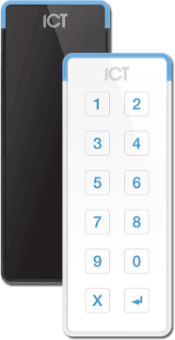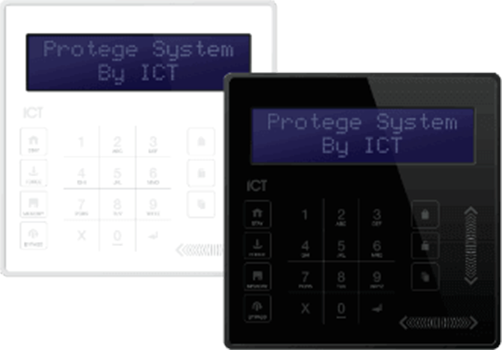Video MGMT System
 Access Control
Access Control
Voice & Data Wiring
 Burglar Alarm
Burglar Alarm
 Fire Alarm
Fire Alarm
Video MGMT System
Voice & Data Wiring
THOUGHT CENTER > Blog > Security Cameras
January 16, 2024
Too busy to read? Here’s a summary:
In the ever-evolving world of security systems, understanding the changing role of the Internet in security camera infrastructure is crucial. That’s why, in today’s post, we’re laying out the benefits and challenges of connecting or disconnecting Internet-capable cameras from the Internet.

Did you know that there are more than six million property crimes in the U.S. in 2022? That’s according to the latest data from the FBI.
Commercial-grade security cameras are digital rather than analog, a format that allows them to transmit data over the Internet using the Internet Protocol.
The Internet Protocol is a set of rules governing the format of data sent over the Internet or other networks. You can think of it as a postal system for the Internet.
Here's how it works:
Data Packaging: When you send data over the Internet, the IP breaks it down into smaller units called packets. Each packet contains data you're sending and important addressing information.
Addressing: Just like postal mail needs a destination address, each packet has an IP address. This address ensures that the packet reaches the correct destination.
Routing: Once the data is packaged into packets, they’re sent through the network. Along the way, routers read each packet's destination address and forward it towards its final goal.
Reassembly: When the data packets reach their destination, they’re reassembled in the correct order to form the original data in full.
IP (Internet Protocol) cameras are digital cameras that transmit video data through the Internet. They're part of an Internet Protocol network that allows authorized users to access and control camera systems and their footage remotely.
In addition to remote access, IP cameras offer benefits like higher-resolution images and cloud storage (video footage data stored off-site, “in the cloud”).
The benefits of IP connectivity are attractive, but there are some risks.
Sending data over the Internet can increase vulnerability to hacking.
A much more common issue stems from the fact that IP cameras are only as reliable as their Internet connection. When the Internet is down, they can’t do much other than sit there confused and pretty.
Digital cameras that have been disconnected from the Internet must process and store high-resolution video digitally on local storage devices, such as NVRs (network video recorders).
Disconnected cameras are often ideal for locations without reliable Internet service or that operate under heightened security. For obvious reasons, keeping cameras offline reduces their vulnerability to hackers and other cybercriminals.
Unfortunately, it isn’t just the bad guys who can’t remotely access offline camera systems. Authorized personnel must be on-site to review footage.
Connecting cameras to the Internet unlocks a range of features like remote access, cloud storage, and real-time alerts.
Internet-connected systems are easier to scale and adapt than isolated systems, making them suitable for growing businesses.
Disconnecting IP cameras from the Internet can mitigate the risk of cyber attacks.
For sensitive areas where data privacy is paramount, non-Internet-connected cameras offer an extra layer of security. Hackers and other bad actors need to come on-site to tamper with such camera systems physically.
Connecting IP cameras to the Internet is pretty straightforward. It typically involves configuring the camera to your network, often through a simple interface or app.
You can disable a camera’s network settings or physically disconnect a camera from its network to turn it into an offline security device.
Choosing between IP and non-IP digital cameras hinges on your specific needs. At Mammoth Security, we’re committed to helping you navigate your options. Whether it’s the advanced capabilities of IP cameras or the standalone reliability of offline cameras, we’ve got the expertise to secure your business effectively.
For a zero-obligation, 100% free site survey and consultation with an expert from our team, just click to contact us and fill in the small form.
NOT COMPLETELY SURE?
860-748-4292IP cameras require an Internet connection to utilize their full capabilities, such as remote access, cloud storage, and real-time alerts. Without the Internet, their functionality is significantly limited.
Yes, digital security cameras can work without the Internet. Non-IP digital cameras store high-resolution video locally on devices like NVRs (network video recorders), making them suitable for areas with unreliable Internet.
Connecting IP cameras to the Internet involves configuring the camera to your network, usually through a simple interface or app.
Businesses might choose non-IP cameras over IP cameras for locations with unreliable Internet, heightened security needs, or to reduce the risk of cyber attacks. Non-IP camera systems operate offline and use on-site storage devices.
In security cameras, the Internet Protocol (IP) works by breaking down video data into packets, assigning IP addresses for routing, and reassembling the packets at the destination to form the original video data.
The difference between IP cameras and non-IP digital cameras lies in their connectivity. IP cameras transmit data over the Internet, offering remote access and cloud storage, while non-IP cameras store data locally and operate offline.
Disconnecting IP cameras from the Internet can enhance security by reducing the risk of cyberattacks. Cameras disconnected from the Internet require physical presence on-site for camera footage access.
The advantages of IP camera connectivity for businesses include remote monitoring, scalability, and access to advanced features like cloud storage and real-time alerts. IP cameras are suitable for even the most dynamic business environments.
Yes, it's easy to disconnect IP cameras from the Internet. You can either disable the camera's network settings or physically disconnect it from the network.
The limitations of non-IP digital cameras in security systems include the lack of remote access, dependence on local storage, and fewer advanced features compared to IP cameras.
In non-IP digital cameras, local storage works by recording and storing high-resolution video data on internal memory or connected local storage devices.